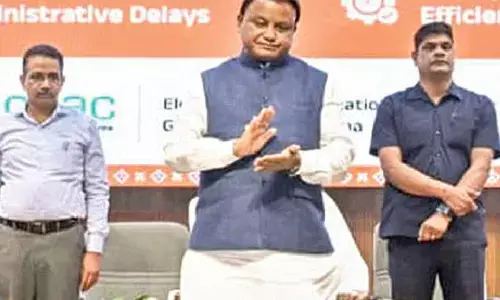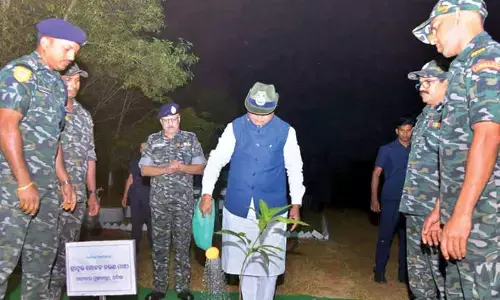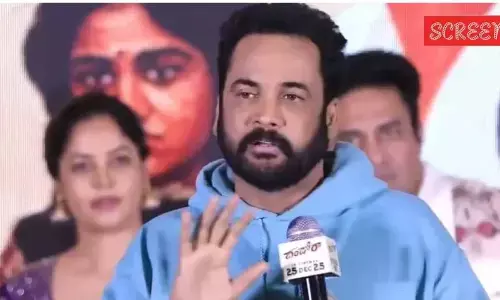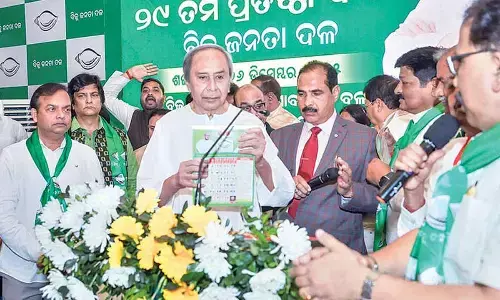AP govt faces judicial test

The High Court has stayed the Swiss Challenge method by which the Government of Andhra Pradesh would decide on the developer for startup area in the proposed capital of the State at Amaravati. Though it is an interim order and a final verdict is still to come, the detailed stay order raises several pertinent questions over this method of choosing a contractor and how far it is followed.
The High Court has stayed the Swiss Challenge method by which the Government of Andhra Pradesh would decide on the developer for startup area in the proposed capital of the State at Amaravati. Though it is an interim order and a final verdict is still to come, the detailed stay order raises several pertinent questions over this method of choosing a contractor and how far it is followed.
The closer reading of the order would provide valuable insights into the legal challenge to the Swiss Challenge method. Even the Telangana government is reportedly mulling over the idea of following the same method for construction of irrigation projects.
Justice M S Ramachandra Rao of the High Court of Judicature at Hyderabad for the State of Telangana and the State of Andhra Pradesh delivered this order, while hearing the case of Aditya Housing and Infrastructure Development Corporation Pvt Ltd vs State of Andhra Pradesh and ORS.
The Government of Andhra Pradesh contemplates development of 6.84 sqkm startup area of Amaravati capital city to facilitate the process of establishment and construction of the new capital city. The Andhra Pradesh Capital Region Development Authority (CRDA) was constituted under the Andhra Pradesh CRDA Act, 2014.
The Andhra Pradesh government entered into a memorandum of understanding on December 8, 2014 with the Government of Singapore. The Singapore government through its agencies submitted Capital Region Concept Plan, City Master Plan (Zoning Plan and Detailed Master Plan) and Seed Capital Area Detailed Master Plan and also provided the extent and details of Development for Capital Region, Capital City and Seed Area in the respective Master Planning Reports.
The AP government formed City Development and Management Corporation Limited as a 100% owned government company for the development of Capital City. The government approved Amaravati Development Partner (ADP) through Swiss Challenge method as per the AP Infrastructure Development Enabling Act, 2001.
The ADP is approved as Master Developer for the Seed Capital Area in the new capital city. The manner in which the selection through Swiss Challenge is made is now under judicial review. The Government of Andhra Pradesh approved Ascendas-Singbridge Pte. Ltd. and Sembcorp Development Ltd as Original Project Proponent (OPP) for Master Developer for Seed Development within the Capital City of Andhra Pradesh. The OPP submitted a proposal for development of Seed Capital Area under the Swiss Challenge method.
Under the Swiss Challenge method, the authorities concerned have to invite competing Counter Challenge Proposal through an international competitive bidding process in a fair and transparent manner. The OPP, as per the “Swiss Challenge Approach,” will be offered the opportunity to match or better the best bid received from a challenging bidder.
If the offer of OPP is superior to or matches or betters the best bid received from challenging bidders, then OPP will be selected. In all other cases, the challenging bidder that has submitted the best bid will be selected.
The Andhra Pradesh government made an amendment. According to this, the challenging bidders were first assessed and those who were qualified in the assessment were only allowed to submit the challenging bids. This has raised concerns among the prospective challenging bidders who sought judicial review.
The essence of a Swiss Challenge method is submission of an unsolicited or suo motu proposal. But, in the case of Amravati development, the consortium submitted the original project proposal as a consequence of the MoU between Governments of Andhra Pradesh and Singapore.
The details of the original proposal like Gross Sales Revenue offered were kept confidential on the pretext that it is proprietary information. Such asymmetry of information between competitive bidders may be detrimental to public interest.
The terms of request for proposals from challenging bidders are alleged to be in favour of foreign developers as against Indian developers by prescribing mandatory experience of development and construction outside India. Although the project is to be executed in India, it did not specify any requirement of having experience in such works in India.
Outside India can include even in countries that which are not as developed as India. Intending developers would be qualified only when they have a high net worth of Rs 2,000 crore. It is feared that such specifications would also eliminate many Indian prospective bidders.
Challenging bidders were given a short time of only 7 days from date of disclosure of the competitive bid. In contrast, the original project proponent had sufficient time and was even given extra time to revise the proposal. Denial of equal and sufficient opportunity would hamper healthy competition which is critical to ensure that the Swiss Challenge approach do not dole out arbitrary favours.
However, the government contention is that the scope for judicial review in the case of terms of tender is very limited. But, the Constitution Bench of the Supreme Court of India in Natural Resources Allocation, in RE. Special Reference No.1 of 2012 laid down that the action of the State, whether it relates to distribution of largesse, grant of contracts or allotment of land, has to be fair, reasonable, non-discriminatory, transparent, non-capricious, unbiased, without favoritism or nepotism and in pursuit of promotion of healthy competition and equitable treatment. It should conform to the norms which are rational, informed with reasons and guided by public interest.
The High Court at Hyderabad in Aditya Housing and Infrastructure Development Corporation Pvt Ltd vs State of Andhra Pradesh and ORS observed: “In a Swiss Challenge method, the proposer’s bid is to be published upfront and interested parties are invited to match the bid or exceed it. This is the challenge to the other bidder. The publication is required to be upfront, and not after the bids are received.”
The competing bidders cannot challenge the original proposal unless they are informed of the revenue sharing offered by the original proponent. The revenue sharing in the sale of plots is the basis for the award of the project. Therefore, there cannot be a challenge without knowing this information. Such information cannot be held back calling it a proprietary information.
Non-disclosure of revenue sharing information contained in the original proposal would defeat the very purpose of Swiss Challenge. The proposal for sharing revenue with the government is the basic commercial information. It cannot be construed as proprietary information and therefore cannot be withheld from the challengers.
As the High Court at Hyderabad rightly observed secrets owned such as intellectual property like patents, trademarks, copy rights, designs etc. constitute proprietary information. But information about the proposed share of revenue by the developer to the owner of property, in this case government, is just commercial information in the contract proposed.
While upholding the adoption of Swiss Challenge method for award of contracts by the State and its agencies, the Supreme Court in Ravi Development v. Shree Krishna Prathishtan stated: “…to make it an effective approach Swiss Challenge Method or any other encouraging concept should be duly publicised first.
The effort of public-private participation can only be possible when private entities are aware of such scheme... All persons interested in such developmental activities should be given equal and sufficient opportunity to participate in such venture and there should be healthy inter se competition amongst such developers.”
The Supreme Court in Tata Cellular v. Union of India clearly stated that the principle of judicial review cannot be denied even in contractual matters or matters in which the government exercises its contractual powers. But it should be exercised in larger public interest because judicial review is intended to prevent arbitrariness.
The High Court has therefore not found fault with the method of Swiss Challenge. But, it only raised serious concerns of arbitrariness in the process. The government now has the task cut out to convince the people and the court that the procedure adopted is not mala fide and intended to favour someone, though the government can have “wider amplitude in formulating conditions of tender document” as observed by the apex court in Assn. of Registration Plates v. Union of India.














